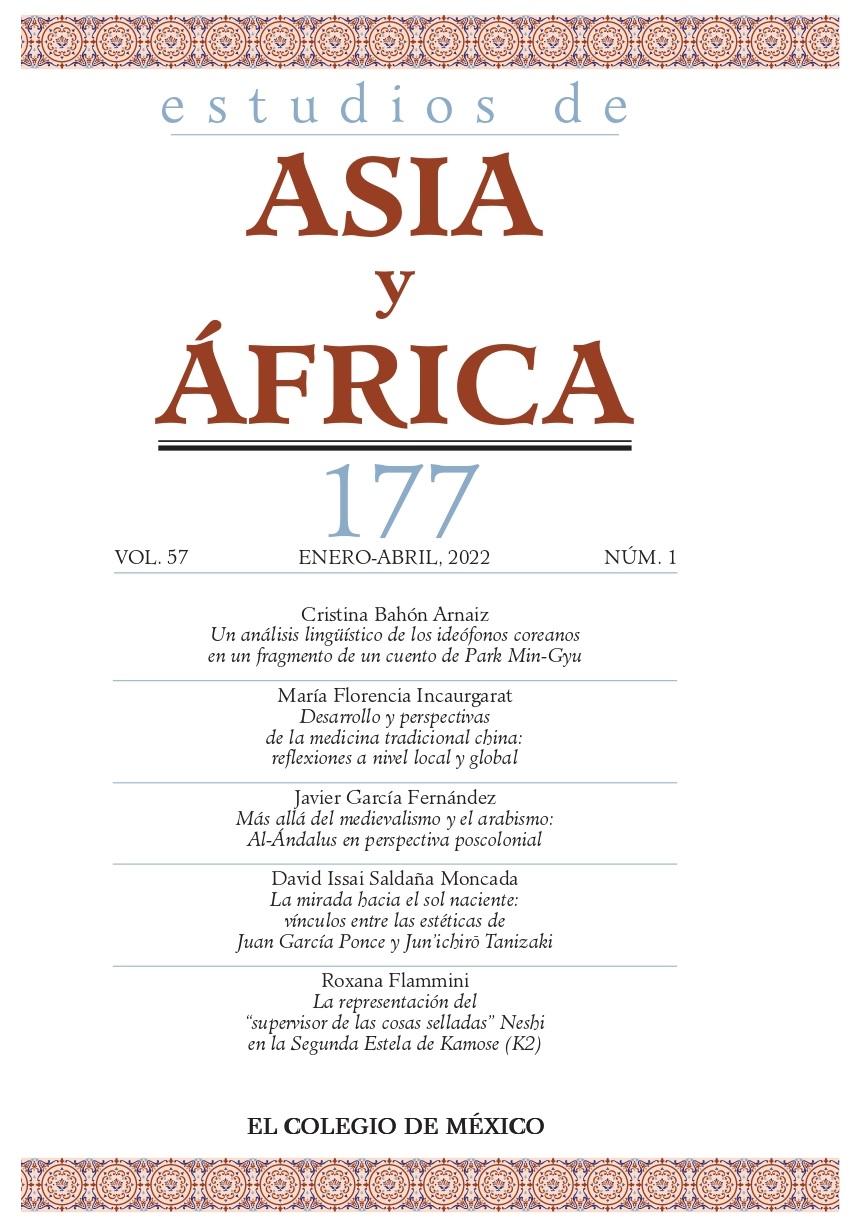Abstract
Zhengmeng is Zhang Zai’s most important and influential work, and it represents his most developed thought. Although the most famous and commented part of Zhengmeng is clearly the opening of the seventeenth chapter (the “Ximing”), the skeleton of the entire work is traditionally considered the first chapter. This article presents the first translation into Spanish of Zhengmeng’s first chapter: the “Taihe pian”.
References
An, Yanming. 2004. “The Concept of Cheng and Its Western Translations”. Dao: A Journal of Comparative Philosophy 4 (1): 117-136. https://doi.org/10.1007/BF02871086
Cheng, Chungying. 1991. New Dimensions of Confucian and Neo-Confucian Philosophy. Albany: State University of New York Press.
Costantini, Filippo. 2014. “La armonía suprema. Análisis del concepto de armonía en el pensamiento cosmológico, ético y social de Zhang Zai 张载 (1020-1078)”. Estudios de Asia y África 49 (1): 9-30. https://estudiosdeasiayafrica.colmex.mx/index.php/eaa/article/view/2052
Costantini, Filippo. 2019. “La crítica de la metafísica budista en el sistema filosófico de Zhang Zai”. Estudios de Asia y África 54 (1): 5-26. https://doi.org/10.24201/eaa.v54i1.2354
Costantini, Filippo. 2020. “Structuring Reality: The Metaphysics of Harmony in Zhang Zai’s Zhengmeng Philosophical System”. Frontiers of Philosophy in China 15 (2): 223-241. https://doi.org/10.3868/s030-009-020-0013-8
Du Baorui 杜保瑞. 2005. Bei Song ruxue 北宋儒学 [Historia del confucianismo de los Song del norte]. Taipei: Taiwan shangwu yinshuguan.
Erlmann, Veit. 2014. Reason and Resonance: A History of Modern Aurality. Nueva York: Zone Books.
Feuillas, Stéphane. 2004. “Penser par contraste. Critique du bouddhisme et stratégies discursives dans le Zhengmeng de Zhang Zai (1020-1078)”. Extrême-Orient, Extrême-Occident, núm. 26, 89-116. https://doi.org/10.3406/oroc.2004.1213
Kasoff, Ira E. 1984. The Thought of Chang Tsai (1020-1077). Cambridge: Cambridge University Press. https://doi.org/10.1017/CBO9780511558511
Kim, Jung-Yeup. 2015. Zhang Zai’s Philosophy of Qi: A Practical Understanding. Lanham, MD: Lexington Books.
Le Blanc, Charles. 1995. “From Cosmology to Ontology Through Resonance: A Chinese Interpretation of Reality”. En Beyond Textuality: Asceticism and Violence in Anthropological Interpretation, editado por Gilles Bibeau y Ellen E. Corin, 57-78. Berlín: Mouton de Gruyter. https://doi.org/10.1515/9783110903010.57
Lin, Lechang, ed. 2012. Zhengmeng Hejiao Jishi 正蒙合校集释 [Interpretación compilada del Zhengmeng]. Beijing: Zhonghua Shuju.
Liu, Jeeloo. 2005. “The Status of Cosmic Principle (Li) in Neo-Confucian Metaphysics”. Journal of Chinese Philosophy 32 (3): 391-407. https://doi.org/10.1111/j.1540-6253.2005.00200.x
Munro, Donald J. 1969. The Concept of Man in Early China. Stanford: Stanford University Press.
Suárez Girard, Anne-Hélène, tr. 2006. Confucio, Lunyu. Barcelona: Random House Mondadori.
Tang, Chün-i. 1956. “Chang Tsai’s Theory of Mind and Its Metaphysical Basis”. Philosophy East and West 6 (2): 113-136. https://doi.org/10.2307/1397078
Wagner, Rudolf G. 2003. A Chinese Reading of the Daodejing: Wang Bi’s Commentary on the Laozi with Critical Text and Translation. Albany: State University of New York Press.
Wang, Robin R. y Ding Weixiang. 2010. “Zhang Zai’s Theory of Vital Energy”. En Dao Companion to Neo-Confucian Philosophy, editado por John Makeham, 39-57. Dordrecht: Springer. https://doi.org/10.1007/978-90-481-2930-0_3
Yang Lihua 杨立华. 2008. Qiben yu shenhua: Zhang Zai zhexue shulun 气本与神化: 张载哲学述论 [El fundamento del qi y las transformaciones de la dimensión espiritual: explicación de la filosofía de Zhang Zai]. Beijing: Beijing Daxue Chubanshe.
Zhang Zai. 张载. 1978. Zhang Zai ji 张载集 [Colección de obras de Zhang Zai], Beijing: Zhonghua shuju.
Zhou Yun 周赟. 2014. Zhengmeng quanyi 正蒙诠译 [Anotaciones y traducción del Zhengmeng]. Beijing: Zhishi chanquan Chubanshe.
Ziporyn, Brook. 2015. “Harmony as Substance”. En Chinese Metaphysics and its Problems, editado por Chenyang Li y Franklin Perkins, 171-191. Cambridge: Cambridge University Press. https://doi.org/10.1017/CBO9781316145180.011
This work is licensed under a Creative Commons Attribution-NonCommercial-NoDerivatives 4.0 International License
Copyright 2022 Estudios de Asia y África



